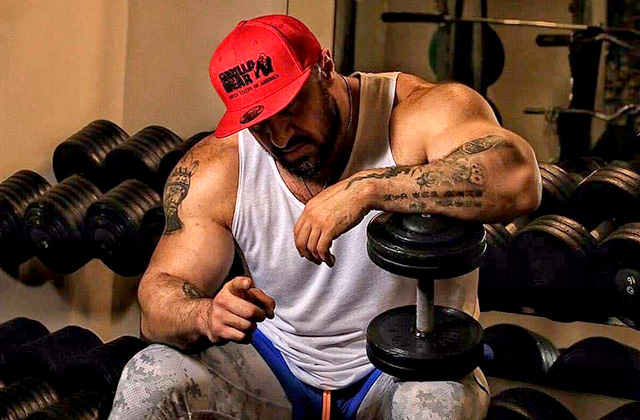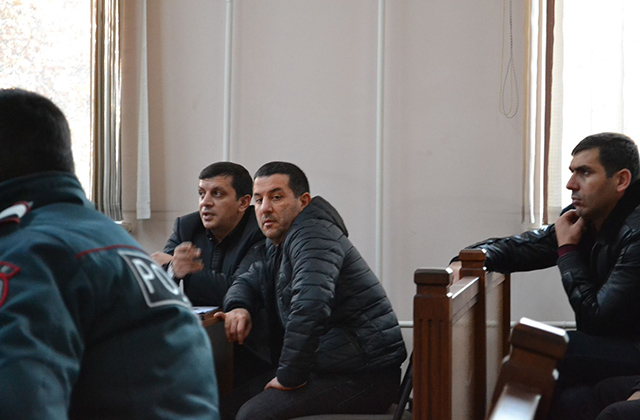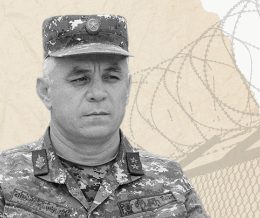
Those Who Make Justice Behind Close Doors and Under the Table

We have covered the court case that involves Armenia’s bodybuilding champion Vahram Hakobyan, which, according to him, is an artificially fabricated case that limits his right of free movement.
To note, in the scope of this court case Vahram Hakobyan and Smbat Avdalyan are being accused under Article 182, Point 3/2 of the Armenian Criminal Code, for an alleged attempt of extortion from plaintiff Vaghinak Ghazaryan.
We have numerously covered this case, but since the beginning of these court proceedings in spring of 2019, this case is being heard in a mysteriously secret condition. Specifically, all court hearings, with no exception, are being held behind close doors, with a pretext that they contain information about the personal life of the plaintiff. It smells like a Soviet-time rusted system: with this same pretext you can manage the entire justice system behind close doors. The beauty of the court system is in the fact that it must be a competitive process, whereas in this case the court deprives one of the parties from an opportunity of access to information and self-protection.
Close Doors and Limitation of Self-defence Right

This case is being heard at the court of general jurisdiction of Center and Nork-Marash communities of Yerevan, where the presiding judge is Karen Farkhoyan. So far almost a dozen hearings have taken place, and the court refused to grant access to any journalist at any of those court hearings by announcing that court sessions are being held behind close doors because they contain information about the personal life of the plaintiff. For me this justification is unacceptable: this is a clear limitation of publicity and the right of access to information. During initial court hearings judge Karen Farkhoyan was taking care of formalities and asking the parties if any of them would be against the participation of a journalist at hearings, and only after hearing a statement of the plaintiff about being opposed to it, he would make a decision to hold hearings behind close doors. However, during the last two sessions, even before court hearings would start, police officers from the building checkpoint approached me and said that I had to leave because those hearings would be held behind close doors. In answer to my question who gave them such an order, they answered:
“The judge’s office”. Isn’t this a decision with prejudice? During the most recent court hearing, which took place on August 5, a police officer approached me and made the same statement claiming that I had to leave, but I asked him in reply: “Are you limiting the access of a journalist to information with prejudice”? I cannot say if he understood the term or not but kept insisting that I had to leave. This is an evident limitation of free speech and journalist’s lawful access to information by biased and prejudiced decision. Or, did the judge know in advance what would be the claimant’s answer to the judge’s question whether to hold the hearing in open or close conditions?
I discussed this issue with Vahram Hakobyan, in answer to which he said. “This is not the first time that Vaghinak Ghazaryan is making statements on behalf of the court. For example, recently he found out that our lawyer was going to submit a petition to the court to release Smbat Avdalyan from court with bail and said that it “doesn’t matter if he is released or not, anyway he had to be taken back behind jars in two months”. Where does he know that from? Are now “plaintiffs” making decisions instead of judges in Armenia?
It is worth mentioning that almost three years have passed since Smbat Avdalyan is behind jars since the beginning of this criminal case, and the court is refusing to release him with bail, even though his lawyer has submitted petitions for releasing against bail a number of times.
The judge has refused Vahram Hakobyan’s petition to take part in court sessions in an online mode, apparently knowing that the latter possesses a lot of information. “During the entire term of COVID, online participation in court sessions has been a common procedure in the entire world, but they refused me to take part in court sessions in an online mode”.
Instead of Reconciliation Courts Fuel Enmity

“On the one hand, instead of preventing enmity and carrying out their duty of reconciliation of people, the Armenian court is sending people to jail based on biased testimony and a lie, and, on the other hand, by doing so they fuel enmity between people. They take the best years of youth from people – let this not sound like a threat, but things like this do not stay without a consequence,” assured Vahram Hakobyan. He is sure that “there has been an influence on the decision of the court”. “Whether with money or a phone call, for us it doesn’t make a difference,” he said.
Unanswered Questions
As someone who has been watching how this case was unfolding from the very beginning, and someone whose right of access to information has been limited, I have a number of questions that haven’t been answered, and perhaps now I don’t have any place to bring those questions up other than here:
1. Why was this case launched by the National Security Services in the beginning? Why is this case so important that in a country that was on the threshold of a destructive war at the time, whose national security services had to spend all their resources on fighting espionage and other real national security threats, that they decided to keep their resources busy with it? Why was this case so important or a national security threat?
2. What’s the principle behind the decision of holding court hearings behind close doors? Is the plaintiff’s statement only enough to decide to hold court hearings behind close doors? If yes, then it is clear where they are taking this case, and what the outcome will be. Is this decision taken solemnly based on one party’s statement? Vahram Hakobyan’s lawyer Karen Stepanyan assures that it is a long time that no personal information related to the plaintiff is being discussed at hearings in such a way that would justify the decision to hold those hearings behind close doors.
3. Who gave them the right to make a prejudiced decision to block the access of a journalist to court hearings or take him out even before they would start? Is it possible that some time in the future you may post an order at the doors of the court saying “Access of journalists is prohibited”?
4. Why does the claimant refuse to give interview? Of course, it is his right, and I totally respect that right, but for the sake of honesty I am emphasizing that I have approached Vaghinak Ghazaryan several times asking to express his opinion, but he refused to speak. Last time I was in contact with him was in a European city before boarding a plane for Yerevan, when he said to me. “It is not good that you are publishing articles like that,” in answer to which I said that “it is always desirable to publish the opinions of all parties for the sake of transparency, and I am inviting you as well to speak your opinion, which, of course, I will publish”, in answer to which he said, “We do not give interviews… Did anyone give you money?” I would refrain from answering such reckless statements because that statement was made in territory that is out of Armenia’s jurisdiction, but the fact is that I did not have an opportunity to ask questions to Vaghinak Ghazaryan, otherwise I would ask him to comment about the statement of Vahram Hakobyan that was published on the pages of 168 Hours saying that Vaghinak Ghazaryan bragged abut his power and influence in the circle of his friends and said that he is rich and “will spend as much as needed just to send Vahram behind cells”.
Processes Unfolding in Line with Classic Scenario
As an individual who repatriated to Armenia after the revolution, this whole thing reminds me George Orwell’s famous classic – the Animal Farm (I hope this article will end up on the table of “Napoleon” too and he will try to find out what is really happening in his “stables”). I have an impression that certain circles needed to get rid of certain people or block their way to Armenia during certain times or put a cap on them in order to limit their influence and actions. “Yes, I agree with you. Perhaps this is a part of a project too, which is aimed at getting rid of influential people – I mean people who could bring others together or in a certain way have influence they do not want”.
In a word, it seems we are perfectly following the scenario of the Animal Farm book, by weakening our “Animal Farm” day-by-day. It seems we have reached the point of that scenario when we lost an important war. Let’s not forget though that there is another war coming up in the scenario of that book… But you are continuing to make unilateral decisions for yourselves behind close doors in your “Stables”.
By Kamo Myailyan























